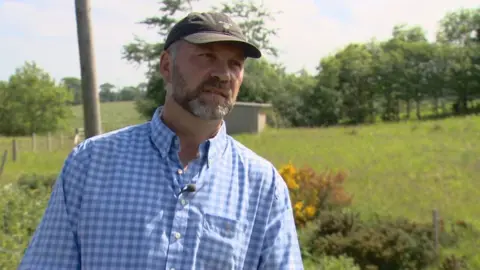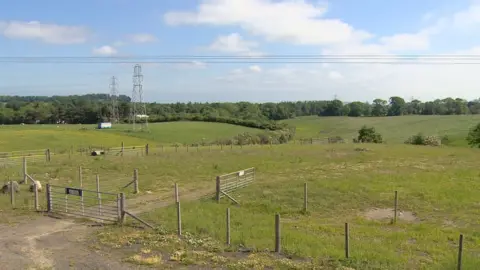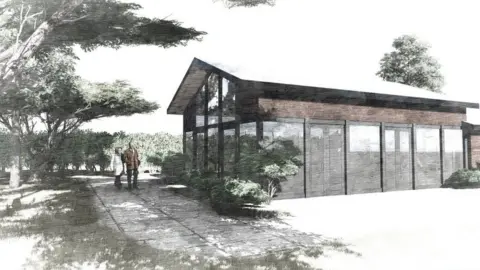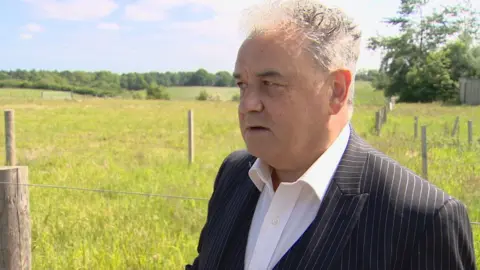Plans for gypsy traveller retirement village to 'break down barriers'
A specially-designed retirement village for gypsy travellers could help "break down barriers", according to the man behind the plan.
Jack Hendry, a successful businessman with travelling roots, wants to build a gated community in West Lothian offering a chance to enjoy old age away from "prejudice and discrimination".
The planning application for the site at Humbie, near Kirknewton, is for 26 homes and a community centre for social, sporting and cultural events.
The village would house travellers, as well as those from the non-travelling ageing population.
Mr Hendry told BBC Scotland: "It is time for change. I want all walks of life to mix."
His proposal has been unveiled as MSPs at the Scottish Parliament debated efforts to improve the lives of Scotland's gypsy travellers.
It follows the publication of a report last month showing a failure of some local authorities to provide sites for travelling people which meet government standards.
It found that just two sites - in Angus and Falkirk - did so. At a number of other sites, operators claimed they would be improved by the deadline of this month, but the report said information from site residents did not support this.
Ministers have promised to publish an action plan to improve the lives of gypsy travellers including improvements for sites and measures to tackle racism.
In the 2011 census, 4,200 people identified themselves as "White: Gypsy/Traveller".
However, organisations that work with the community said some may have chosen not to tick that box and that Scotland's traveller community could comprise of between 15,000 to 20,000.

The unconventional life that many travellers lead often brings with it problems, particularly when it comes to health and social care.
Figures from the Equality and Human Rights Commission suggest that gypsy travellers' life expectancy is 10 years lower than the national average.
Research has also shown they use NHS services less than other members of the population and less likely to register with a GP and attend for screening or immunisation.
Medical treatment
Mr Hendry said his plans for a retirement village could help tackle some of these issues.
While the traditional and romantic view of travellers is perhaps one of "life on the road" or in caravans and mobile homes, Mr Hendry, said that for older people that is often not practical.
"I'm from gypsy background myself and for elderly gypsy travelling people getting housing is very, very difficult," said the road surfacing businessman.
"When people reach a certain age - and they need operations and medical treatment - they've got to have a settled home. Unfortunately they can't stay in a caravan."

 Pollock Hammond Ltd
Pollock Hammond LtdA planning application for the site at Humbie, which Mr Hendry owns, has been lodged with West Lothian Council.
The 26 homes would be "high quality" lodges which would be accessible for the elderly and capable of being adapted to suit residents' individual needs.
"This isn't just another business opportunity," he said. "I feel there is a genuine need for this kind of development."
His vision is of a community where travellers and non-travellers can live together and create "integration and understanding".
'Great place to start'
Last year, the Scottish Parliament's equalities committee heard evidence that discrimination against gypsy travellers in Scotland had become the last form of "acceptable racism".
The most recent Scottish Social Attitudes survey found 34% of people in Scotland believed a gypsy/traveller was "'unsuitable" to be a primary school teacher, and 31% would be unhappy if a close relative married a gypsy/traveller.
Mr Hendry said he found these kind of statistics "offensive" and "disgusting".
"I think it's time to change," he said.
"This is a chance for both the settled and the traveller community to live together. This is a lovely location to do that. It's a great place to start."

And for planning consultant Alan Seath, who is managing the project, "breaking down barriers" and "bringing people together" is at the heart of the plan.
"It'll be open to non-travelling elderly people in an attempt to break down the divide between travellers and the settled community," he said.
Mr Seath said the aim was to tackle issues around age and ethnicity and a "lack of facilities" for those demographic groups.
The village would provide housing, but also access to social and cultural services with the communal building acting as a "one-stop-shop" for activities and NHS outreach services.
"What Mr Hendry is doing is providing good quality, residential accommodation in a nice environment," he said.
"By building something like this we hope to improve the health and well-being of all in the community."
